
31 minute read
News from Organizations Affiliated to IGU
by IGU
This issue we lead with an update on the World LPG Association’s WINLPG initiative and follow with further news from WLPGA, the Gas Technology Institute (GTI), Energy Delta Institute (EDI) and International Pipe Line and Offshore Contractors Association (IPLOCA) who also share their history in the features section on pages 148-153. We conclude with an article from NGV Global on their achievements in 2015 and plans for the coming year.
Changing the Face of the LPG Industry: Women in LPG Global Network
By Alison Abbott Women have never been in a stronger position to lead, change and shape the economic, social and political landscape. The 21st century has seen a dramatic shift in traditional ‘family’ dynamics and greater recognition of gender in legislation. As a result, women are more economically independent and socially autonomous. As growing numbers of women enter the economic mainstream, they will have a profound effect on global business and social change. Some people may ask why women need a special network and support program, but when you start to evaluate it, there are many overwhelmingly compelling personal, professional and business reasons that support the significant benefits of advancing women in leadership in the corporate and entrepreneurial world.
Having more women in management positions improves a company’s financial performance and can boost company returns. Evidence shows that companies with women on their board can out-perform their rivals by a 42% higher return on sales by enhancing company decision making through use of all available perspectives, ideas and skills 1 , reflecting the gender diversity of customers and employees is beneficial to the industry. The industry also suffers from the negative perception of being old fashioned and uninteresting, indeed, a recent graduate survey showed that the oil and gas industry as a whole is one of the most unpopular career paths 2 .
Many companies support mentoring and development of senior women as a pipeline to talent at board level, firstly because board members can gain insight and learn from the relationship but most importantly because it makes good business sense. It is estimated that over the next 5-10 years, women will make up 80% of the growth in the world labour market and organizations need a clear strategy to attract and retain women at all levels. If you really take the time to digest all the arguments for gender equality, the economic facts alone are overwhelming and the long-term gains for businesses who support and inspire women to participate in the LPG Industry are already proven to be significant.
According to Energia, an NGO focusing on women’s issues in the energy industry, most LPG consumers are women. Many women make and manage the purchasing decision and it is largely women who are using the product. However, within the industry itself there are few women, not only at executive level, but at all levels. This phenomenon is shared in many
1 www.gov.uk study “Women on Boards: 5-year summary”, www.gov.uk/government/publications/womenon-boards-5-year-summary-davies-review.
2 PwC 2011 survey of 4,364 graduates from over 75 countries.
sectors of the energy industry and indeed in other areas of business.
There is an opportunity for the global LPG industry to take medium- and long-term actions that can address the issue of attracting, retaining and developing women in the LPG industry. As the authoritative voice for the global LPG industry, the World LPG Association (WLPGA) is uniquely positioned to develop and implement these actions.
So, to address this issue and develop a strategic response to the issue of attracting, retaining and developing women, and in fact young people in general, to work in LPG, the WLPGA has set up a new global network, the Women in LPG Global Network (WINLPG) which was launched in September 2015. The network’s mission is to support and help empower women in the worldwide LPG industry by leadership, coaching, mentoring and promoting role models to enable a change in organizational attitude to become more inclusive and authentic for all genders at all operational levels. WINLPG aims to bring women, and men, together across all business sectors, ages and levels to discuss and support the development of diversity within the LPG industry. WINLPG aims to create a network of members on a global basis who can support women to make a difference to themselves, their teams and ultimately their organizations. It will provide a platform and opportunity for like-minded people at all levels to meet, formulate strategies, cultivate relationships and develop a ‘making a difference’ plan. It will give a global opportunity for women and young people to communicate directly with successful female leaders, coaches and mentors who can help them with purpose-driven solutions to career, business and organizational challenges.
What will WINLPG do?
WINLPG has three pillars of objective. First of all to support and retain women already in the industry through a network that will enable women to further their professional development and access colleagues and mentors. Secondly, to promote role models and case studies via the media and at industry events and, thirdly in the more long term, to work with universities to educate and attract women to the industry.
WINLPG has a provisional goal of increasing the number of women in middle management to 40% and at board level by 30% by 2030.
The network set-up will mirror three existing WLPGA networks and in the immediate term will meet three times a year with a flagship meeting to be held at the time of the World LPG Forum. Regional workshops are scheduled to tie in with other industry events. At press time the first regional workshop was planned to take place in Bogotá in March 2016 at the time of the Latin American LPG Association’s annual conference.
WINLPG is chaired by Nikki Brown, Managing Director of Cavagna UK, and is coordinated from WLPGA by Alison Abbott.
“The issue is that gender balance is not optimized in the LPG industry and WLPGA is in a unique position to start to make a change,” says Alison Abbott. “This change to
c Anita George, Senior
Director of the World Bank Group’s Global Practice on Energy and Extractive Industries, speaking at the first WINLPG meeting in Singapore.
v Lee Yi Shyan, Senior
Minister of State, Ministry of Trade & Industry, delivering a keynote address at the 28th World LPG Forum in Singapore.
be driven by a network that will recommend actions and activities as part of the WLPGA strategic planning process.”
It is important to emphasize that WINLPG is not a club, and its focus is not about the promotion of women just because they are women. It is about the promotion of women despite being women but maybe, even more importantly, WINLPG wants to encourage and give support to an industry-driven philosophy where individuals are chosen for a position because they are the best person for the job despite gender, sexuality, race or age.
If you are interested in joining WINLPG please contact Alison Abbott.
For more details contact:
Alison Abbott, WLPGA Communications Director.
Email: aabbott@wlpga.org Website: www.worldlpg.org Twitter hashtag: #WINLPG
A Bridge to the Future – The 29th World LPG Forum & 2016 AEGPL Congress
By Esther Assous If you only attend one LPG industry event each year then the World LPG Forum should be the one. Travelling the globe each year, the World Forum unites the full LPG global industry in one packed week giving unparalleled networking and business opportunities.
The 29th World LPG Forum & 2016 European Congress is the third time that WLPGA will combine its Forum with the European industry, following Madrid in 2010 and London in 2013. The event will take place in Istanbul, Turkey from September 27-29 in the International Convention and Exhibition Centre under the theme “A Bridge to the Future”.
The event has developed over the years into a highly influential week combining not only a high-level conference and major exhibition but also a choice of dedicated

smaller summits and dynamic side events which cover the entire industry.
This year’s Global Technology Conference will showcase the most innovative and original technological ideas in the industry and entry is free for exhibitors.
The exhibition is the centre of the event and offers exceptional networking opportunities. It’s the unique showcase for key LPG companies to present their cutting-edge technology, first-class equipment and services to the international and regional LPG community. Coffee and lunch break stations situated within the exhibition area guarantee further interaction. In addition to the conference attendees, external visitors will also be strongly encouraged to meet you face-to-face in the exhibition.
Registration for delegates and visitors will open in April. For full details about the Forum visit the dedicated event website www.worldlpgforum-aegpl2016.com.
For more details contact:
Esther Assous, WLPGA Events Director.
Email : eassous@wlpga.org Website: www.worldlpgforum-aegpl2016.com Twitter hashtag : #LPGistanbul2016
Developing a New Quantification Protocol for Methane Emissions Reduction
By Diane Miller In the US, aggressive efforts are underway to reduce methane emissions from the natural gas sector and the industry is working on technologies and approaches to facilitate this. But the way emissions are quantified must also be improved. By establishing reasonable baselines, utilities will be able to provide more accurate reports about their emissions profiles and implement mitigation and reduction programs. Gas Technology Institute (GTI) and its industry partners are working to update those baselines now.
“It’s important for us to help the industry better quantify its methane emissions profile and incorporate this data into an overall mitigation strategy that puts safety and the environment at the top of the priority list,” says Paul Armstrong, GTI Director of Business Development. “GTI understands that this is a critical issue for the natural gas industry as a whole and that each industry sector has its own unique challenges that must be addressed.”
Since 2009, GTI has taken the lead in addressing the gaps in determining a more accurate emissions baseline for the natural gas distribution sector, leading a multi-phase
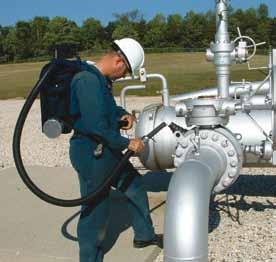
project designed to develop a methodology that can provide a greater level of accuracy.
The first phase of the project, completed in 2010, focused on developing a new technique to measure emissions. Researchers field-tested and validated an approach to measuring methane emissions at the surface using the Hi-Flow Sampler, a portable device that provides efficient, real-time measurements of gas flow rates and concentrations.
The GTI team then set out to update the national emission factors (EFs) for plastic pipe. Expanding the dataset beyond that of the original 1996 Gas Research Institute study,

c Using a Hi-Flow
Sampler, a portable device that provides efficient, real-time measurements of gas flow rates and concentrations.
c Quantifying methane
emissions from the natural gas sector is one strand in an overall reduction strategy.
the testing program provided a new national EF estimate that was much more representative of plastic distribution systems. Subsequent phases of the project continued the field test program for cast iron and unprotected steel pipe.
A methodology for implementing revised EFs has also been developed, launching a new approach that will enable operators to create utility-specific emissions estimates based on their own leak data instead of national estimates to more precisely define their individual company profiles.
In the final phase of the project, the GTI team is focusing on implementation of the new EFs and improving estimates for activity data. In the proposed methodology, activity data may be based on miles of pipeline (as used by the US Environmental Protection Agency [EPA]) or on annual leaks records for each utility. The team will address implementation of activity data on a per-leak basis, using existing leak, repair, and duration records.
The results will deliver a case based on highquality data and improved processes for the acceptance of the new quantification methods for compliance with EPA reporting requirements and other emissions regulations. This will include communicating with various stakeholders, such as trade organizations and environmental groups.
In addition to developing these more accurate methods for quantification, GTI is also developing technologies and processes for detection, prevention, and mitigation of methane emissions. A tool that can accurately quantify emissions in the field and provide emissions data that can help prioritize repairs, as well as be used for emissions reporting, is under development. Researchers are evaluating the use of alternative technologies, such as optical gas imaging cameras, to detect and quantify leaks throughout the natural gas system. Although much of GTI’s work has been focused on emissions up to the meter, a new project being sponsored by the California Energy Commission will measure emissions beyond the meter, with a focus on the commercial sector. Researchers are investigating the amount of methane being released from homes and commercial buildings, using an approach that focuses on specific points within the structure and nearby exterior locations. GTI’s knowledge and experience with gas piping, distribution mains, gas connections, and appliances is providing knowledgeable insight to identify the best testing locations.
GTI is also promoting close collaboration among partners in industry, government, research, and academia as the environmental concerns around methane emissions are being discussed and debated. For the past two years, GTI has organized a conference, CH 4 Connections, that features insights from industry thought leaders and experts on quantifying methane emissions, new technologies, and best practises for leak detection and mitigation in natural gas production, transmission, and distribution. The event focuses on the solutions to mitigate the impact of methane emissions while providing the public with needed energy and services.
Another round of the CH4 Connections conference will be held later in 2016 in Washington DC; details are still being finalized. Check GTI’s website at www.gastechnology.org for updated information on dates and location.
Diane Miller is Senior Marketing Communications Manager at GTI (www.gastechnology.org).
Future Leaders of the Energy Industry
By Nadja Luchtmeijer The European energy industry, and the global energy industry in general, is undergoing significant transformation. The traditional business models of fossil energy producers and utilities are increasingly challenged by the emergence of new market players, rapid integration of

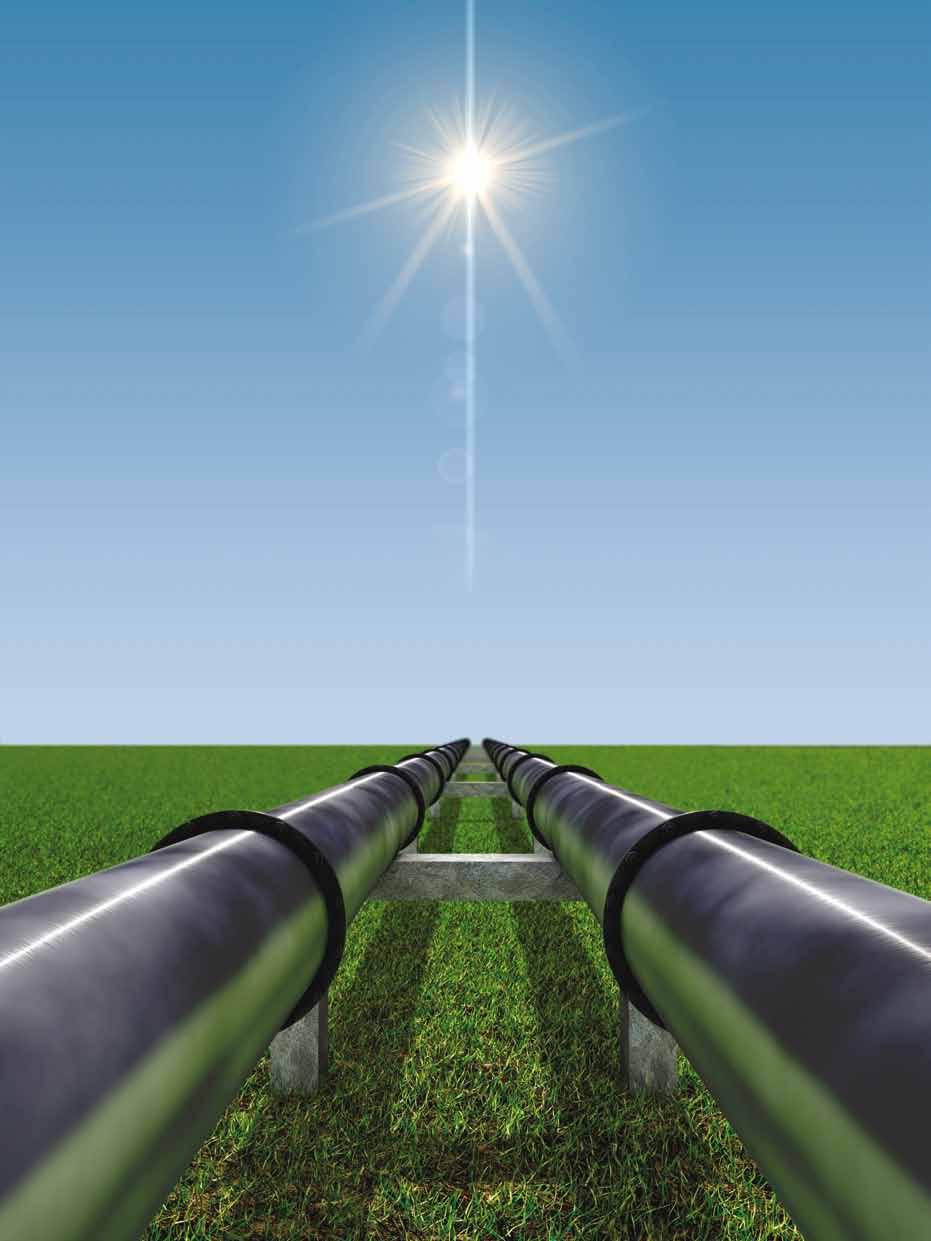
The Force of Our Energy Empowers Our People
renewables in the energy system, technological development, low oil price, changing policies and the implications of climate change, particularly after the successful COP 21 summit in Paris. How can a traditional energy company survive this change and be successful in the new energy reality? This is the question that Energy Delta Institute (EDI) keeps asking itself and the industry.
As the readers of this magazine might know, EDI has its roots in the natural gas sector, and we see that this ongoing change in the energy landscape also has an impact on EDI’s activities. According to EDI’s Vice President for Innovations, Bert Stuij, the industry needs to find a business model which is robust in the changing environment and also needs to have a clear vision for the future and strong leadership to withstand the change. The concern, however, is not mainly about the leadership within the company, but the positioning of the company in the current and future market.
Alnogside EDI’s existing programs, such as Mini MBA New Energy Realities, Mini MBA Energy Transition and Innovation and European business management courses, which are focused on new business models, finance, innovation and leadership, EDI was keen to continue its work on developing new programs that are oriented on assisting (young) energy professionals in challenges they face in the current energy environment.
In this framework, EDI was very enthusiastic and proud to begin its collaboration with the FLAME conference, the largest annual European meeting of global gas community and LNG leaders. Together, we have designed a new program – the FLAME Future Leaders Master Class, which provides a carefully selected set of topics and tools for early/mid-career professionals, who are ambitious to make the transition to senior management roles in the future. Highly recognizable speakers from the energy industry, who are speaking at the FLAME conference this year, are also involved

in this master class, taking place from May 9-11 in Amsterdam (parallel to the main FLAME conference).
EDI has asked the organizers of the FLAME conference to share their views on this master class with the readers of the IGU magazine. Below we include a short interview, which gives more insights into this distinguished program.
EDI: Why was FLAME interested in organising the FLAME Future Leaders Master Class next to the main conference?
FLAME: We are constantly striving to ensure that FLAME evolves along with the gas industry it serves. Energy companies are increasingly needing to innovate to stay competitive and this means investing in the next generation of leaders. It is no secret that the industry is facing a possible shortage in the numbers of qualified candidates. We want to offer aspiring industry professionals an in-depth, up-to-date master class that will enable them to meet the needs of their companies and the changing world around them.
EDI: What are the benefits for [young] professionals participating in this master class?
FLAME: This master class is designed for those who want to expand their knowledge, skill set and network. Participants will benefit from a CPD-accredited course on energy industry fundamentals, business and finance models, corporate strategy and leadership skills. They will learn from outstanding industry experts
through hands-on case studies and a new business model game, created especially for this master class. Finally they can benefit from three days networking with over 650 FLAME 2016 attendees, representing more than 170 energy companies from over 40 countries, taking back to the office an increased depth of knowledge and contacts.
EDI: Which developments in the industry have stimulated FLAME to focus this master class on the new business models and leadership?
FLAME: By raising the profile of the energy industry as one of the most exciting to work in, future energy leaders will be professionally and personally equipped to remain competitive. With this in mind, having a clear understanding of energy market fundamentals, business and finance models, strategic positioning, technology, global trends in business and the changing nature of the workplace is essential.
EDI: It is essential that energy professionals have a grasp of the main industry drivers. What are these drivers, from your perspective?
FLAME: We believe that these drivers are as follows: knowing how to respond to the outcome of COP 21; the relatively negative press surrounding the gas industry; the significant reduction of gas demand in recent years; the drop in oil price; the slowdown in emerging markets; the consequences of Russia’s geopolitical activity in Ukraine; and the changing market structure and challenges facing utilities.
EDI: How was EDI chosen for the development of this master class?
FLAME: EDI is a world class, respected, international energy business school. We wanted to offer a tailored program that prepares the next generation of energy leaders in the coming years and with EDI’s rich knowledge of the market and outstanding training courses it was the obvious choice.
For this last question, EDI’s Vice President for Innovations, gives his comment: “In its activities, EDI is bridging the current energy realities and the new realities, providing a platform for an open dialogue. We increasingly focus on leadership, innovation and energy transition in our activities, following the industry trend. We believe in building networks between the “old” industry players and the “new” ones, and in sharing the knowledge between them. The FLAME Future Leaders Master Class provides the context, where this can be achieved in an efficient and effective manner. Future energy leaders should master openness, awareness and agility to thrive in this new world.”
EDI would like to thank the FLAME organizing committee and Bert Stuij for their contribution to this article. For more information about the FLAME Future Leaders Master Class please visit EDI’s home page (www.energydeltainstitute.org). We would be happy to welcome participants from the IGU.
Nadja Luchtmeijer is a Senior Energy Analyst at Energy Delta Institute (www.energydelta.org).
News from IPLOCA
By Juan Arzuaga Around 510 members, media partners and guests attended the 49th International Pipe Line and Offshore Contractors Association (IPLOCA) Convention in Singapore from October 5-9, 2015. The IPLOCA Convention, taking place over five days, is a unique annual gathering of the leading global players in the pipeline construction industry. This was the second IPLOCA Convention to be held in Singapore; the last one taking place in 1989.
During the convention, the association elected its Board of Directors for 2015 to 2016. The following were named to positions on the board:
v Front row:
Jan Koop, Rubén Kuri, Atul Punj, Andrew Ball, Jean Claude Van de Wiele, Juan Arzuaga.
v Second row:
Jim Frith, Mesut Sahin, Haldun Iyidil, Georges Hage, Bruno Maerten, Marco Jannuzzi (since retired), Ma Chunqing.
v Third row:
John Tikkanen, Iosif Panchak, Doug Evans, Adam Wynne Hughes, Wilhelm Maats, Oliviero Corvi.
v Fourth row:
Ebbo Laenge, Steve Sumner, Larry Bolander, Scot Fluharty, Doug Fabick, Najib Khoury, Bruno Guy de Chamisso. Not present: Jaya Sinnathurai.
Officers
Atul Punj (Punj Lloyd), President; Director, East & Far East; Rubén Kuri (ARENDAL), 1st Vice President;
Director, Latin America; Andrew Ball (J. Murphy & Sons Limited), 2nd
Vice President; Director, Europe North-West; Jan Koop (Bohlen & Doyen), Treasurer; Director,
Europe Central; and Jean Claude Van de Wiele (Spiecapag),
Immediate Past President.
Directors
Haldun Iyidil (Limak Construction Industry and
Trade), Director, Europe Eastern; Iosif Panchak (Stroygazmontazh), Director,
Europe Eastern; Mesut Sahin (Technip), Director, Europe Central; Oliviero Corvi (Bonatti), Director, Europe
Mediterranean;
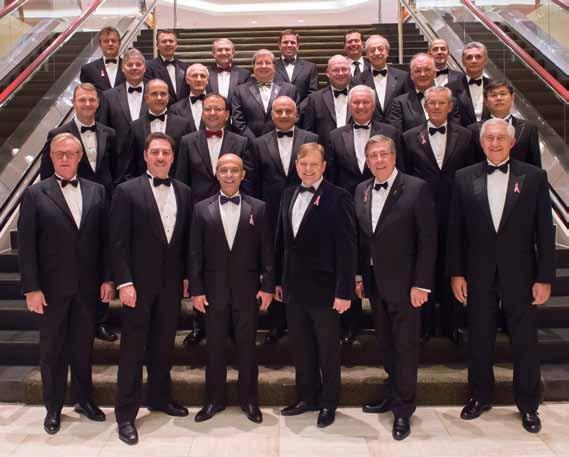
Bruno Guy de Chamisso (Spiecapag), Director,
Europe Mediterranean; Adam Wynne Hughes (Pipeline Induction Heat),
Director, Europe North-West; Larry Bolander (Fluor), Director, America North; Scot Fluharty (Mears Group), Director, America
North; Ebbo Laenge (Conduto), Director, Latin America; Georges Hage (The C.A.T. Group), Director,
Middle East & Africa; Najib Khoury (CCC), Director, Middle East &
Africa; Ma Chunqing (China Petroleum Pipeline),
Director, East & Far East; Jaya Sinnathurai (Caterpillar), Director, Associate
Members; Steve Sumner (Lincoln Electric), Director,
Associate Members; and Doug Fabick (PipeLine Machinery), Director,
Associate Members.
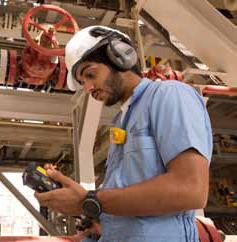
The growing demand for clean energy resources LNG has emerged as a strong competitor in the global energy arena
The United Arab Emirates and its capital Abu Dhabi, is recently witnessing a rarely matched boom and comprehensive development in all walks of life. As a key contributor to the development march of the Emirate of Abu Dhabi, Abu Dhabi Gas Liquefaction Company Ltd (ADGAS) had and continues to play a strategic role, spanning for more than four decades of operations in the LNG industry, and has built a long experience and excellent reputation in the global energy market.

Building on its long experience and excellent reputation in the global LNG market, ADGAS has managed to lay a solid foundation in the natural gas industry, being the first LNG production company in the whole Middle East region. Since its foundation in the early 1970s, ADGAS signed a long term agreement with Tokyo Electric Power Company (TEPCO), to power the Japanese capita l of Tokyo with electricity for 20 years. This unique and successful partnership was further strengthened with the signing of a new agreement, before the first even expired. Under this new agreement, ADGAS would double its LNG production, and this would be purchased by TEPCO for an additional 25 years.
In addition to Japan, ADGAS’ unrivalled global reach of LNG, LPG (Propane and Butane), Paraffinic Naphtha and Sulphur has grown, enabling ADGAS to get closer to consumers in America, Europe, Korea and the Far East.
Additionally, ADGAS plays a central role in the UAE’s economic development, ensuring that a sustainable source of energy is available to meet Abu Dhabi’s growing demand for energy. After the completion of two strategic projects; namely the Offshore Associated Gas (OAG) project and the Integrated Gas Development (IGD) project, ADGAS has recently started to feed gas to the national grid by exporting around 1 billion cubic feet of ga s on a daily basis to onshore processing facilities. Furthermore, to meet the increasing energy demand of Abu Dhabi, expansion of IGD facilities is currently being undertaken to provide an addition of 400 MMSCFD of gas, which will increase daily gas exports by 2018 to 1.4 billion standard cubic feet.

v At the presentation of
IPLOCA’s Health & Safety Award for 2015 are (from left to right): Bruno Maerten, Chairman of the IPLOCA HSE Committee; Harald Dresp and Giovanni Muriana from Max Streicher; Bruno Guy de Chamisso of Spiecapag, Mike Prior from Michels Corporation and Jean Claude Van de Wiele, Spiecapag.
Directors-at-Large
Doug Evans (GIE); Jim Frith (McConnell Dowell); Wilhelm Maats (Maats Pipeline Equipment); Bruno Maerten (Entrepose), Chairman of the
HSE Committee; and John Tikkanen (ShawCor).
The Open General Meetings held on Thursday and Friday included presentations on a wide variety of subjects including the history of Singapore, the feasibility of new pipeline projects in the new macroeconomic environment, trends in international upstream mergers and acquisitions in a depressed oil price market, efficient deep water seabed intervention, pipeline projects in Saudi Arabia, and high pressure water transmission pipelines.
The full list of guest speakers was as follows:
Ho Chi Tim, Instructor, Department of
History, National University of Singapore (NUS): Beyond the Singapore Story –
Historical Connections to Region, Empire and the World;
Ricardo Markous, Gas & Power General
Diector, Tecpetrol, Techint Group: Feasibility

of New Pipeline Projects in the New
Macroeconomic Environment and with
Increasing Capital Expenditure Costs; ◆ Jonathan Green, Business and Competitive
Intelligence Manager, Addax Petroleum Ltd:
Trends in International Upstream M&A in a
Depressed Oil Price Environment; ◆ Jan Vlak, Operations Manager, Van Oord
Offshore bv: Efficient Deep Water Seabed
Intervention with the Van Oord Deep
Excavation System; ◆ Andreas Kohler, Managing Director, ILF
Business Consult and Alexander Heinz, Head of Water Pipeline Engineering, ILF Consulting
Engineers: The Market for High Pressure
Water Transmission Pipelines; and ◆ Mansour S. Al-Shehri, Manager, East West
Pipeline Projects Department, Saudi Aramco:
Pipeline Opportunities with Saudi Aramco.
Members also attended the Annual General Meeting and the presentations of three industry Awards: the IPLOCA Health & Safety Award sponsored by Chevron, the IPLOCA Corporate Social Responsibility Award sponsored by Total, and the IPLOCA New Technologies Award sponsored by BP.
IPLOCA Health & Safety Award
The award is in recognition of members’ initiatives, all of which are aimed at improving the health and safety of the pipeline industry.
This year, the award was presented by Bruno Maerten, Chairman of the IPLOCA HSE Committee to Max Streicher S.p.A., in recognition of their Belt System. The Adjudication Committee made their decision for the following reasons: this initiative shows employee engagement; it is derived from the analysis of accidents; it is a simple, efficient and innovative solution.
Also recognized as runners-up were Michels Corporation for their “Promise Me” video campaign that brings safety back to its real goals, and Spiecapag for their “Finish Strong” initiative that emphasizes safety in the last phases of a project.
IPLOCA Corporate Social Responsibility Award
The award is presented in recognition of an initiative aimed at improving the living conditions of the people in communities local to, and impacted by, pipeline industry work.
Marc Geniteau of Total and Bruno Maerten presented the award to Technip for their policy “Encouraging a Fair Return for All”. This project was selected for its involvement in long-term planning, its applicability to projects worldwide and the fact that it is a self-funded initiative. In addition, it shows top-level management commitment and promotes environmental awareness.
Two runners-up were also named: Saipem S.p.A. for the “Promotion of Entrepreneurship Opportunities”, a long term and self-funded program; and Spiecapag for their Community Capacitation program applicable to multiple projects.
IPLOCA New Technologies Award
This award is given every second year in recognition of a significant achievement in the development of new pipeline technologies.
It was presented by Michael Hiam of BP and Jean Claude Van de Wiele, Chairman of the New Technologies Committee, to Denys and Selmers, in recognition of their work on their onshore automatic vacuum field joint blasting. This entry was chosen because the new tool improves HSE conditions for workers in the field; it is an initiative that involves both a contractor and a manufacturer working together, and it is an example of technology transfer from the offshore to the onshore industry.
Two runners-up were also named: Herrenknecht AG, for their new drilling tools that increase performance of horizontal directional drilling; and PipeSak, for their PipePillo Structural Pipeline Pillow, a simple and very creative method.
The IPLOCA 50th anniversary convention will take place in Paris, September 12-16, 2016. To read more about the history of IPLOCA and its half century of service to the industry see pages 148-153.
Juan Arzuaga is Executive Secretary of IPLOCA (www.iploca.com).
NGV Global Marks 2015 Achievements; Plans Major Event for 2016
By David Perry NGV Global, as the international trade association for the natural gas for transportation sector, is committed to advocating the many benefits of natural gas as a fuel and maximizing opportunity for the industry. It is affiliated with IGU and supports their work to increase opportunities and remove barriers for the adoption of LNG, CNG and renewable natural gas.
It does this through leading and participating in working groups and committees for international standards and regulations, the building of relationships, and sharing information via high-level consultation and events, and through various communications.
Much was achieved in 2015 on behalf of all industry stakeholders, as described below,
v NGV Global met with
authorities of Daegu, Korea, during discussions on NGVs in the region and the country’s participation in the industry.
and 2016 promises to be rich with opportunity and challenge. In October this year, the world’s attention will turn to St Petersburg for NGV Global 2016, being held for the first time in Russia and in conjunction with the St Petersburg International Gas Forum.
Standards and Regulations – 2015 Achievements
◆ NGV Global provided Secretariat support to the Task Force that amended UN regulation
R-110 to include LNG fuel system components. This inclusion will allow LNG vehicle approval, which requires the fuel system components to be certified. ◆ NGV Global partnered with the European
LPG Association (AEGPL) and succeeded in securing the approval of CNG and LPG as accepted fuels for trucks transporting dangerous goods (previously only LNG had been accepted, after another effort by NGV Global). ◆ NGV Global participated in the work of the IGU study group WOC 5.3 “Natural
Gas Vehicles”. ◆ NGV Global continued to lead the standardization efforts for an ISO inter

national standard on CNG and LNG fuelling stations. ◆ NGV Global continued to take the voice of our members to every standardization committee dealing with NGVs. NGV Global leads the efforts at the ISO and the UN, and collaborates with NGVA Europe for the
European Committee for Standardization (CEN) and NGV America and the Canadian
Natural Gas Vehicle Alliance (CNGVA) for the
Canadian Standards Association (CSA). The goal is to provide harmonized standards which will allow manufacturers and installers to have global compatibility. As examples of the work carried out, NGV Global has conferred with and represented members on the following items: ❚ ISO 17519 Gas cylinders — Refillable permanently mounted composite tubes for transportation (ISO TC58 SC3). ❚ ISO/CD 13769 Gas cylinders — Stamp marking (ISO TC58 SC4 WG6). ❚ ISO PC252 Natural gas fuelling stations for vehicles. ❚ ISO TC22 SC41 Specific aspects for gaseous fuels (WG3). ❚ ISO TC 220 Cryogenic vessels.





v International Technical
experts met at CSA Headquarters in Cleveland, USA, to work on ISO PC252 –Fuelling stations for CNG & LNG.
ISO TC 67 SC9 Liquefied natural gas installations and equipment.
ISO TC 58 Gas cylinders.
These activities continue in 2016. Included in goals for this year is conclusion and publication of ISO standards on LNG and CNG fuelling stations to be published during 2016 and follow-up on new proposals for amendments and modifications of UN R-110. NGV Global is working with IGU’s WOC 5.3, contributing to a report on Gas for the Transportation Industry for the US IGU presidency.
Relationships and Events – 2015 Highlights
The Korean association KANGV joined NGV Global as an affiliated organization. Associations representing Argentina, Asia-Pacific, Brazil, Canada, Europe, Italy, Russia, and the USA are also members.
NGV Global conducted an NGV Technical Forum in the US during ACT Expo 2015, to address specific technical issues presented by North American firms – including a discussion on gas quality. Similar forums will be conducted in Europe and in North America during 2016.
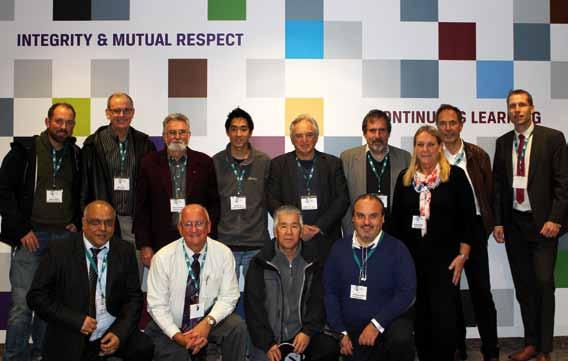
A joint technical Global Experts Committee was formed with representatives from NGV America, NGVA Europe, NGV Italy, CNGVA and the Asia Pacific Natural Gas Vehicles Association (ANGVA).
NGV Global worked with IGU to organize and deliver the first ever dedicated NGV pavilion at a World Gas Conference (Paris, June 2015), and participated at the IGU Council meeting. IGU has determined to include the use of natural gas in transportation as one of the 10 key issues of the triennium.
A cooperation process was initiated with CSA toward international participation of the North American NGV industry.
In recognition of the expanding applications for natural gas fuel, NGV Global broadened its activities to cover the use of natural gas in ships, both marine and inland waterways, through ISO and cooperation with the Society for Gas as a Marine Fuel (SGMF).
In collaboration with NGV Global, GasTech 2015 presented an NGV Centre of Technical Excellence (CoTE) in Singapore.
Information and Guidance – 2015
NGV Global participated in a high-level meeting with Korean government agencies and government (KEITI, Ministry of Environment), companies (KOGAS) and the Korea Gas Union. The purpose of the meeting was to discuss the future of NGVs in the region and Korea’s participation in the NGV industry in particular and the gas industry in general. Korea will hold the IGU presidency in the next triennium.
The association also assisted in the cooperation between the US Department of Energy and the government of Israel to prepare Israeli government officials for the introduction and supervision of NGVs.
NGV Global participated in several other events throughout 2015, enhancing capacity for its members and industry stakeholders, and will build on this growing and effective presence throughout 2016 and beyond.
These activities are funded in large part by sponsor and member contributions. To continue this work, NGV Global invites industry stakeholders to join by inquiry to the Executive Director, Diego Goldin (dgoldin@ngvglobal.org).
NGV GLOBAL 2016
The Association’s 15th consecutive biennial conference and exhibition – NGV GLOBAL 2016 – will be held in St Petersburg from October 4-7.
Since 2013, when the government decreed massive targets for natural gas refuelling infrastructure and natural gas fuelled fleets, Russia has taken a fresh look at the many benefits of utilizing natural gas as a clean, sustainable mobility fuel. Vehicle and component manufac

turers are investigating partnerships with companies outside of Russia to gain market advantage. At the same time, northern Europe has focused strongly on LNG for marine transportation, Europe-wide LNG corridors for heavy duty vehicles are advancing, and the CNG/ renewable natural gas fuel market across all of Europe continues to expand.
Resultant vehicle development, engine technologies and gas storage innovation are of interest to both new and maturing NGV markets. “Although natural gas has been a familiar component of Russia’s economy for a long time, its transportation sector is akin to a new market burgeoning with opportunity,” says Goldin.
We strongly recommend participation at NGV Global 2016 as a valuable forum for knowledge exchange and more importantly a commercial platform into one of the world’s new natural gas for transportation markets.
Please contact the Conference Secretariat at ngv2016@conceptevents.com.au or +612 9436 0232 for information, or go to www.ngv2016.com.
David Perry is the Business Manager of NGV
x A natural gas filling
station in Sterlitamak, Republic of Bashkortostan, Russia. Russia is examining the benefits of natural gas as a vehicle fuel.
Global (www.ngvglobal.org).
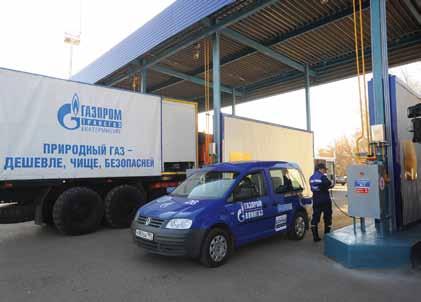
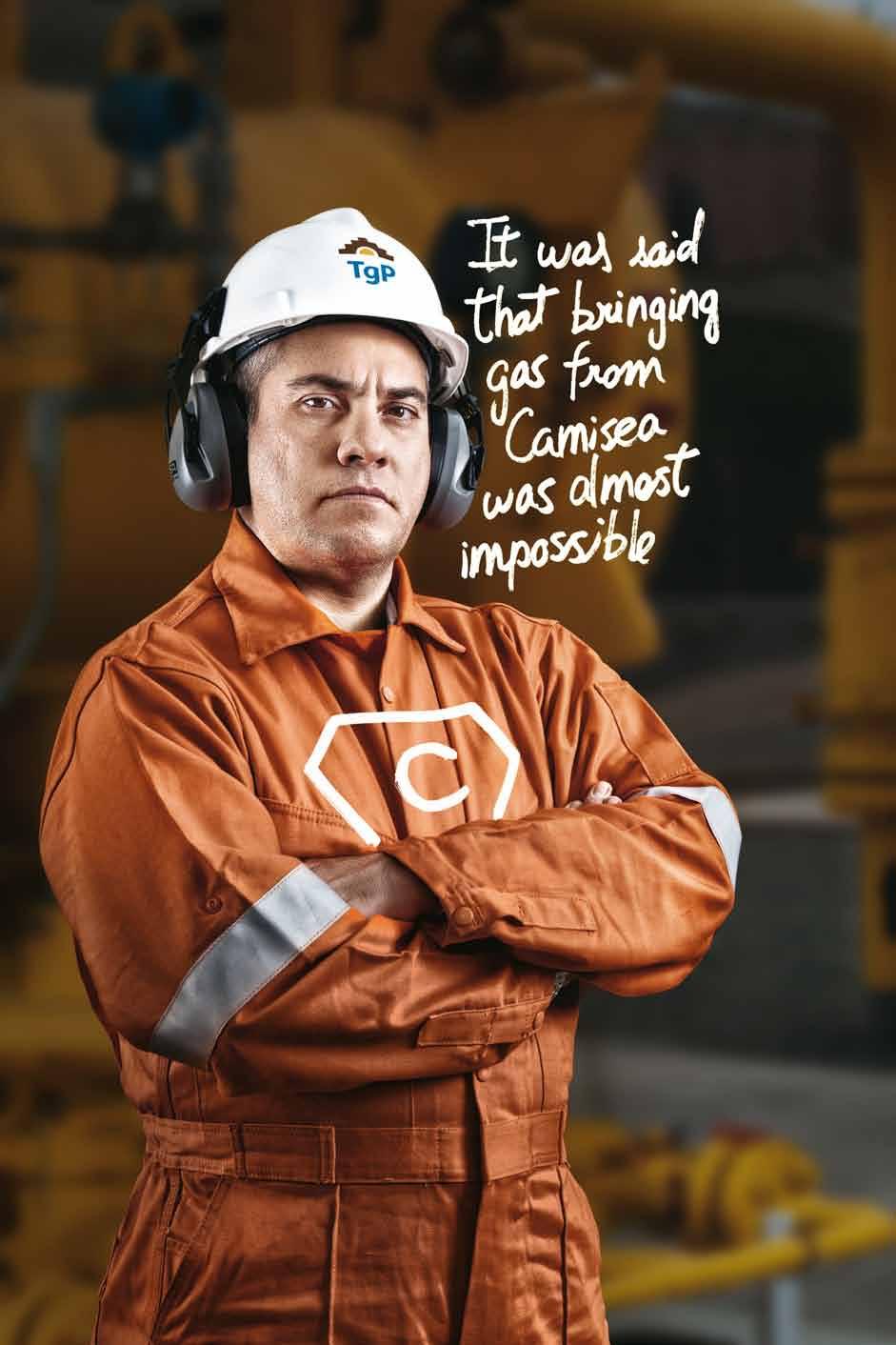
Focus on Research & Development and Innovation
The new triennium is already strongly underway, guided by the presidency of the United States, and with it has come an expansion of the work of IGU’s committees and task forces. We introduce this new section of the publication highlighting the ongoing work of IGU’s expert membership with an article discussing just some of the ways that they are sharing their knowledge both within the industry and with the wider world.
Following are three papers from the Research & Development and Innovation committee. First we gain insight into a new methane-hydrogen fuel technology that could aid in the transition to a hydrogen-based economy; thereafter two papers look at different aspects of power-togas applications, the relationship of the process to renewable energy and its technical and economic aspects.










